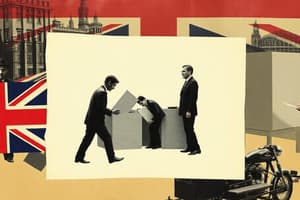Podcast
Questions and Answers
What is the main purpose of a General Election in the UK?
What is the main purpose of a General Election in the UK?
- To elect the London Mayor
- To elect local councilors
- To vote on referendums
- To elect 650 Members of Parliament (MPs) (correct)
Foreign citizens without UK citizenship are allowed to vote in UK elections.
Foreign citizens without UK citizenship are allowed to vote in UK elections.
False (B)
What role does the leader of the political party with the second largest amount of seats take in Parliament?
What role does the leader of the political party with the second largest amount of seats take in Parliament?
Leader of the opposition
The political party with the most seats in a General Election is invited to form a ______.
The political party with the most seats in a General Election is invited to form a ______.
Match the following groups with their voting eligibility status in the UK:
Match the following groups with their voting eligibility status in the UK:
Which of the following is NOT a requirement to be elected as an MP?
Which of the following is NOT a requirement to be elected as an MP?
Returning Officers must begin counting votes by 2 AM after the polls close at 10 PM.
Returning Officers must begin counting votes by 2 AM after the polls close at 10 PM.
What must a candidate submit to the returning officer on nomination day to stand for election?
What must a candidate submit to the returning officer on nomination day to stand for election?
In important matters deemed too significant for representatives, governments may call for ______.
In important matters deemed too significant for representatives, governments may call for ______.
Which of the following is considered unconstitutional regarding voting in the UK?
Which of the following is considered unconstitutional regarding voting in the UK?
What is the purpose of a 'Declaration of local connection'?
What is the purpose of a 'Declaration of local connection'?
Local government elections in England are held every five years.
Local government elections in England are held every five years.
What system is used for electing councillors in England and Wales?
What system is used for electing councillors in England and Wales?
The standard Personal Allowance in 2019 was £______.
The standard Personal Allowance in 2019 was £______.
Match the following local authority types with their characteristics:
Match the following local authority types with their characteristics:
What is true about the tax-free personal allowance in the UK?
What is true about the tax-free personal allowance in the UK?
Citizens must pay tax on rental income from properties they rent out.
Citizens must pay tax on rental income from properties they rent out.
Which voting system allows voters to rank candidates in order of preference?
Which voting system allows voters to rank candidates in order of preference?
The tax year in the UK runs from ______ to ______.
The tax year in the UK runs from ______ to ______.
Which of the following is NOT a type of local authority in England?
Which of the following is NOT a type of local authority in England?
Flashcards
General Election
General Election
A UK election to choose Members of Parliament (MPs) for the House of Commons.
Constituency
Constituency
A specific area that elects a Member of Parliament (MP).
Member of Parliament (MP)
Member of Parliament (MP)
A person elected to the House of Commons in the UK.
House of Commons
House of Commons
Signup and view all the flashcards
Prime Minister
Prime Minister
Signup and view all the flashcards
Electoral Law
Electoral Law
Signup and view all the flashcards
Returning Officer
Returning Officer
Signup and view all the flashcards
Official Opposition
Official Opposition
Signup and view all the flashcards
Voting Rights Restrictions
Voting Rights Restrictions
Signup and view all the flashcards
Nomination Forms
Nomination Forms
Signup and view all the flashcards
Declaration of Local Connection
Declaration of Local Connection
Signup and view all the flashcards
Electoral Commission
Electoral Commission
Signup and view all the flashcards
Local Authorities/Councils
Local Authorities/Councils
Signup and view all the flashcards
First Past the Post
First Past the Post
Signup and view all the flashcards
Local Government Elections
Local Government Elections
Signup and view all the flashcards
Council Responsibilities
Council Responsibilities
Signup and view all the flashcards
Mayoral Elections
Mayoral Elections
Signup and view all the flashcards
Tax
Tax
Signup and view all the flashcards
Personal Tax Allowance
Personal Tax Allowance
Signup and view all the flashcards
UK Taxable Income
UK Taxable Income
Signup and view all the flashcards
Study Notes
UK Elections
- Various elections exist, including general, local council, European, and mayoral elections.
- General elections occur at least every five years to elect 650 Members of Parliament (MPs) in the House of Commons.
- The candidate with the most votes per constituency wins the seat.
- The party with the majority of seats forms the government; its leader becomes Prime Minister.
- The second-largest party becomes the official opposition, with its leader as Leader of the Opposition.
- Individuals who cannot vote include House of Lords members, many prisoners, mentally incapable individuals, those under 18, foreign citizens without UK citizenship, and those with recent (within 5 years) election-related crimes.
- Technically, the royals do not vote due to constitutional guidelines requiring neutrality.
- Vote counting must begin within 4 hours of the poll closing (typically 10 PM), or a statement explaining the delay is needed.
- To run for general election, candidates must submit nomination forms and a £500 deposit by the deadline.
Who Can Be an MP?
- Most eligible voters can stand as an MP.
Referendums
- Referendums are used for important issues like power sharing (1998) and EU membership (2016).
Voter Turnout
- Voter turnout among disadvantaged groups has declined recently.
- Homelessness used to prevent people from being on the electoral roll, but now they can claim a 'declaration of local connection.'
Electoral Commission
- The Electoral Commission, established in 2000, ensures the integrity of the UK's democratic process.
Local Government
- Local authorities, or councils, decide on local services.
- Local elections occur at least every four years, with variations in election frequencies.
- Local government systems are classified as one-tier (unitary) or two-tier (county and districts).
- England has 353 councils, with many different categories.
- Elections for Local Government use: First Past The Post system (England & Wales), Single Transferable Vote (Scotland & Northern Ireland).
Council Responsibilities
- Councils manage various services, including children's services, social care, public health, libraries, planning, roads, emergencies, and more.
- Their role also involves improving the quality of life through elements like floral displays.
Mayoral Elections
- Some UK areas choose mayors using the Supplementary Vote system, requiring voters to select a first and second choice.
UK Tax System
- Taxes are compulsory contributions to state revenue for aspects like workers' income and business profits or added costs to goods, services, and transactions.
- The tax year is from April 6th to April 5th next year (a tradition from medieval times).
- Every UK citizen has a tax-free personal allowance — £11,850 in 2019 — but this can change based on factors like marriage or disability.
Tax Types
- Several types of tax exist in the UK, including Capital Gains Tax, Corporation Tax, Income Tax, Inheritance Tax, National Insurance, Excise Duties, Insurance Premium Tax, Petroleum Revenue Tax, Stamp Duty, VAT, TV Licence, Landfill taxes, Business rates, Green taxes, Air Passenger Duty, Climate Change Levy, and Vehicle Exercise Tax.
Tax-Free Allowances
- Tax-free allowances include ISA savings interest, dividends from company shares, the first £1,000 of self-employment income, the first £1,000 of rental income, some state benefits, Premium Bond or National Lottery winnings, rent from a lodger (below the rent-a-room limit), and Married Couple's Allowance (for reduced rates).
Taxable Items
- Taxes are typically levied on income from employment, self-employment profits, certain state benefits, most pensions, rental income, job benefits, trust income, and savings interest (beyond allowance, or outside ISAs).
Studying That Suits You
Use AI to generate personalized quizzes and flashcards to suit your learning preferences.




